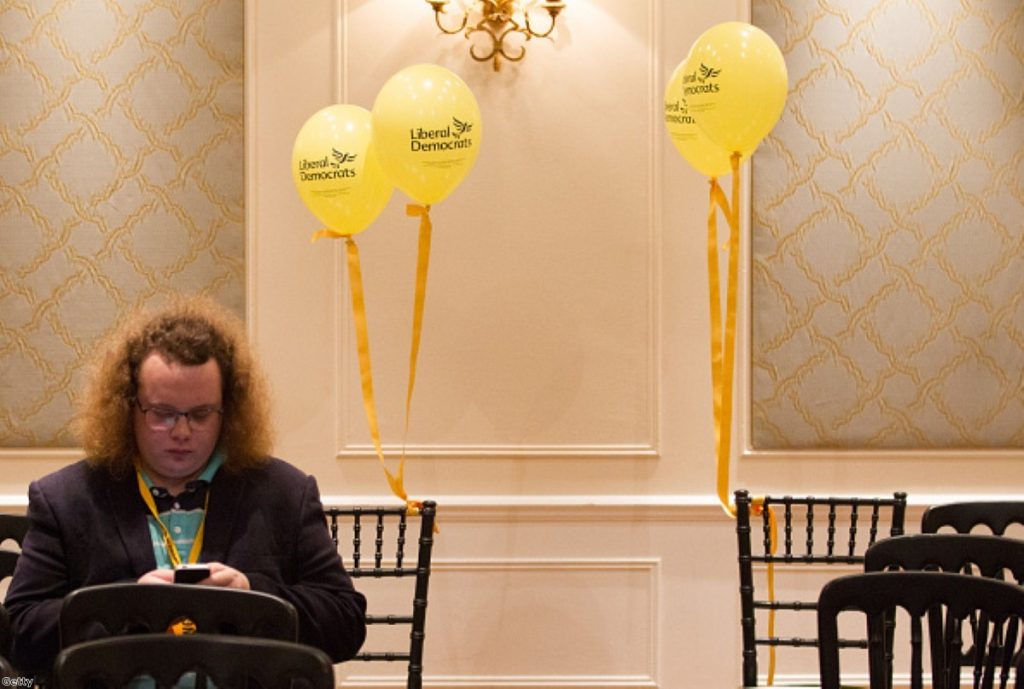If a Lib Dem conference takes place and no-one realises, did it really happen?
You often see conferences getting overshadowed. The Tory one in 2008 was completely knocked sideways by the banking collapse, for instance, but Cameron could at least grab that bull by the horns and make impromptu speeches about it.
What can Tim Farron do about the fact the prime minister may have had sex with a dead animal? An impromptu speech doesn't seem to cut it. Pig-gate is so far off the radar of normal political discourse that there's no obvious way to respond but to look on, baffled and amused, as it burns itself out.
It could be a blessing in disguise. At least it gives the Lib Dems an excuse for the lack of media coverage. The truth is, pig-gate or no pig-gate, there was never going to be much attention to what's going on in Bournemouth.
Typical! David Cameron once again hogging the headlines at the Lib Dem Conference.
Featured
 BASC given permission to bring judicial review of Defra decision
BASC given permission to bring judicial review of Defra decision
Featured
 Concern over doctors’ health needs as legislation to regulate PAs and AAs introduced
Concern over doctors’ health needs as legislation to regulate PAs and AAs introduced
— Paddy Ashdown (@paddyashdown) September 21, 2015
I've seen one camera crew here and a smattering of journalists. Poor Farron tried to spark some media interest by insisting Labour people had been in touch considering defection, but the Today interview he did on Monday strongly suggested this was a fib. They've surely been on the phone complaining – the way things are right now, they'd complain to their bus driver – but the gap between that and defection is wider than Farron imagines. He'd be better off getting his head down, winning some respectable local election results, giving the impression of upwards movement, and then talking up the chance of defections in a couple of years.
Even potential terrorists don't seem very interested. The security operation, which expanded into its own police state when the Lib Dems were in government, has now shrunk back down to the village fete variety.
"How are you?" I asked the elderly gent checking my pass this morning. "I'm here," he replied, sighing. "That's as much as I've got to offer." You get the sense you could probably swan in, pass or no pass. No-one is paying much attention.
Inside the conference centre, everything continues as it used to do in government and, to be fair, as it did before government. Lib Dems take things very seriously. Yesterday they debated unilateral nuclear disarmament (they voted against). Today it's housing and social care. In each case the debate takes place in a vacuum-sealed alternate political reality, where they have the slightest ability to decide such matters. This is a party with eight seats behaving as if it was leading negotiations at the UN.
It’s not that they don't recognise their radically diminished status. It’s that the emotional reality hasn't sunk in. They're like someone still numb from a bereavement.
New Lib Dem leader Tim Farron faces uphill struggle to make party relevant again
It's more saddening than anything. Whatever your politics, Lib Dems are simply the nicest of the bunch. That's not an opinion. It's a scientific fact rigorously-tested over years of party conferences. They are unfailingly reasonable, civic-minded and amusing. Compared to the Labour conference, the Lib Dem get togethers are an absolute pleasure. They're even more fun than the Tory conference, where proceedings are typically polite and fuelled by good wine.
One really can't savour the Lib Dem fall from grace. They're just too nice. But there is a certain docile quality to the party's members, an extremist unflappability. If you were lost in the woods, you’d want a Lib Dem with you – someone who could probably read a compass and wouldn't get too panicky. But if you're heading for electoral oblivion, say, you might not. Sometimes it’s OK to be well and truly flapped.
The ideal time for a proper Lib Dem flap would have been late 2014, when a new leader could have limited some of the damage and turned an eight-seat score card into a 20-seat one. But failing that, now might be a good time. This is a party which should be asking big questions. Those questions should include whether the Lib Dems are happy to accept the economic policy of parties they go into coalition with. They might also ask if they want to appeal to a broader electorate with policies like free school meals, or a narrower but uncommitted electorate by standing up for civil liberties and an egalitarian system of law.
Those questions aren't being asked. Instead there is a lot of talk of whether the British system can incorporate diverse politics and the various tactical or communication errors of coalition. These are good questions, but they are not the main ones. That Lib Dem reasonableness will be the death of them.
Not that anyone knows. The conference centre seems entirely removed from the world outside. That's always the case at conference, but it is particularly the case at this one, where the world moved on and the prime minister might have had sex with a dead pig. The sad thing is one imagines that next year it'll be even worse. There'll be even fewer journalists and their deep debate about national security or solar energy will look even more cut-off from reality.
It doesn't have to be that way. Senior Lib Dems, including Clegg, Farron and Norman Lamb, are all convinced Jeremy Corbyn's victory opens up a rich world of political possibilities on the centre. And perhaps it will. But if the Lib Dems ever want to be taken seriously by the public again, they need to start asking themselves bigger questions than they are right now.


